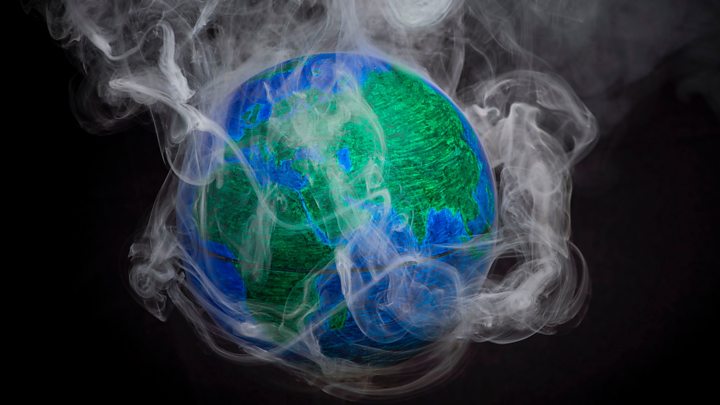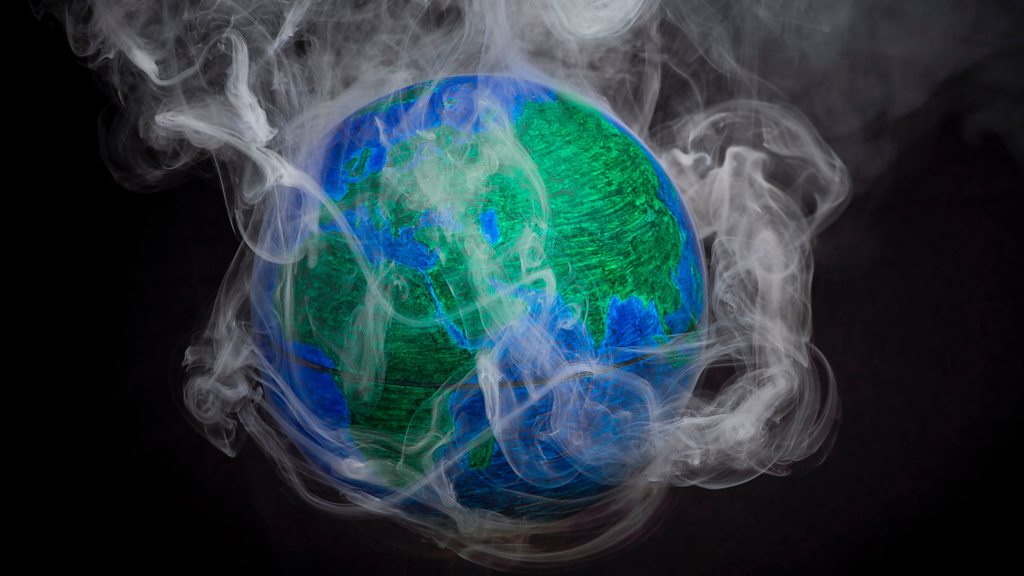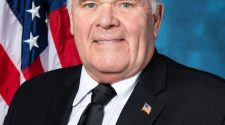
Media playback is unsupported on your device
Business leaders, cities and investors are being urged to back a UN campaign aiming for net-zero greenhouse gas emissions by 2050.
Race to Zero is part of the diplomatic push to increase ambition in the lead up to the COP26 international climate change summit in Glasgow next November.
It is the first major event since it was confirmed the summit was being postponed due to coronavirus.
Nestlé and Rolls-Royce are among the first to endorse the campaign.
Around a third of the world’s GDP is already committed to the principles of Race to Zero, the UN estimates.
UN climate chief Patricia Espinosa warned that the coronavirus pandemic must not lead to delays in committing to emissions cuts.
Image copyright
UNFCCC
Patricia Espinosa said governments and industry “must act now”
She said: “While we had little warning about Covid-19, we had years of warning about climate change.
“We must act now to avoid the tragedy that runaway climate change would cause. It is entirely within our power to do this.
“If Covid-19 has taught us anything it is that society can, where necessary, pull together to address a global challenge.”
- New date agreed for UN climate summit in Glasgow
- Scientists fear car surge will see CO2 rebound
In a virtual launch that was troubled with technical problems, a speech by COP26 president Alok Sharma – who is also the UK business secretary – was cut short.
Mr Sharma was making his first public appearance since taking ill at the dispatch box of the House of Commons on Wednesday.
Image copyright
UNFCCC
Alok Sharma called on the international community to work together
He said: “By working together we can absolutely make progress much faster.
“I do believe that COP26 can be that moment when the world unites behind a fairer recovery from the effects of Covid-19, a recovery that ultimately delivers for both our people and of course our planet.”
One of the world’s biggest manufacturers of plane engines, Rolls-Royce, has committed to the campaign.
Last month, the company announced 9,000 job losses because of the impact of Covid-19.
About 700 jobs are expected to be cut at its plant in Renfrewshire.
Chief executive officer, Warren East, told the launch: “Our business historically has all been about fossil fuels but over the last few years we have been tilting the balance towards the journey to zero carbon.
“We are probably best known in aviation and that is one of the most difficult sectors to decarbonise. But that ambition is at the heart of how we make ourselves competitive in the future.”
The Race to Zero launch comes as the Energy and Climate Intelligence Unit estimates that 53% of global GDP is produced in countries, states and regions and cities that have committed to net-zero targets.
Senior fellow Adair Turner said: “It is technologically and economically possible for the whole world to reach net-zero emissions by mid-century, and essential in order to limit global warming to well below 2C,” he said.
“So it is heartening that an ever-widening range of leading countries, companies and cities are committing to that objective. The very fact that they do so will spur the investment and innovation needed to make the goal attainable.”
Stronger cuts
This year marks the date by which countries are expected to come forward with stronger emissions cuts to meet the goals of the deal.
Plans submitted so far put the world on a pathway towards more than 3C of warming, though the Paris Agreement commits countries to curb temperatures to 1.5C or 2C above pre-industrial levels to avoid the worst impacts of climate change.
But with countries around the world grappling with coronavirus, and many putting citizens in lockdown, governments have prioritised the immediate global health crisis.
Since the pandemic took hold, greenhouse gas emissions have dropped sharply as industry and transport have been curtailed, but experts have warned that pollution will soon bounce back without climate action.
















